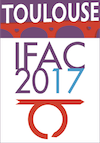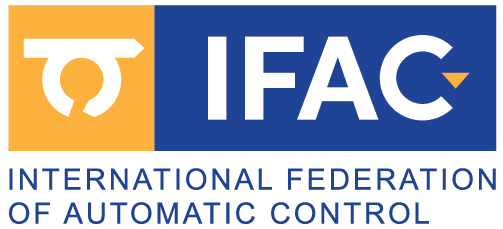Latest 4 submitted open invited tracks: Intelligent Control, Fractional Calculus, Optimization-based Control for Nonlinear Systems, Demonstrator of Reactive Navigation with the Pepper Robot, Financial Supply Chain. See details below.
Title: Intelligent Control and Automation
Track proposed by: Matilde Santos
Abstract: The aim of this track is to bring together different communities working on different aspects of intelligent control and advanced algorithms in system engineering and automation. The track will discuss some fundamental issues on control of complex systems, including application of soft computing techniques, heuristic optimization, intelligent approaches, both for system modelling and control design, and potential applications to real-world systems.
Code for submitting contributions: af13j
Full description: PDF
Title: Advances in Fractional Calculus. Theory and Applications
Track proposed by: Cristina Ioana Muresan, Konrad Andrzej Markowski, Dana Copot
Abstract: In the last couple of decades, fractional calculus had played a very important role in various fields such as: physics, chemistry, mechanics, electricity, biology, economy and control theory. Moreover, it has been found that the dynamical behavior of many complex systems can be properly described by fractional order models. Such tool has been extensively applied in many fields which has seen an overwhelming growth in the last decade. The special session is intended to review new developments based on the fractional differentiation, both on theoretical and application aspects. This special session is a place for researchers and practitioners sharing ideas on the theories, applications, numerical methods and simulations of fractional calculus and fractional differential equations. Our interested topics are enumerated in the below and submissions in the relevant fields are welcome. The topics of interest include, but are not limited to:
- numerical and analytical solutions to fractional order systems;
- new implementation methods;
- improvements in fractional order derivatives approximation methods;
- time response analysis of fractional order systems;
- the analysis, modeling and control of phenomena in: electrical engineering; electromagnetism; electrochemistry; thermal engineering; mechanics; mechatronics; automatic control; biology; biophysics; physics, etc.
Code for submitting contributions: 3f8mv
Full description: PDF
Title: Optimization-based controller design for nonlinear systems: analytic and geometric analysis
Track proposed by: Frederic Jean, Hasnaa Zidani, Roberto Ferretti
Abstract: Optimization-controller design has been appealing in engineering areas for over several decades because it allows to use powerful theoretical and numerical tools from optimal control for analyzing and designing controllers for advanced and complex control systems. This field has far wider scope than its first applications to aerospace engineering would suggest, and now embraces areas where the dynamical models describe chemical reactors (process control), vehicles (traffic flow control), wind generators and solar panels (power systems control) or might even describe virtual economic systems relating management decisions to economic consequences over time (econometrics and resource economics). The pressure to develop more efficient processes in order to meet the demands of next generation technology is leading to problems of increasing size and complexity.
Despite the great progress in the development of numerical solution methods in the last decades, the increasing complexity of models and control tasks triggers a constant demand for more and more efficient methods. Whenever applicable, analytical methods (based on geometric control and/or nonsmooth analysis) are even more useful, because they provide closed solution formulas which are easy to evaluate and yield structural insight into the behavior of the optimal solution.
Another main challenge in the field of optimization-based controller design is to develop numerical algorithms that are sufficiently fast and accurate for the much-needed techno-logical developments, in numerous industrial sectors.
This open invited track will bring together leading researchers who are working on optimization-based controller design, who combine expertise in theoretical, numerical and application oriented aspects of the field. The aim is to discuss some of the recent developments of the field and to stimulate future advances.
Code for submitting contributions: n781n
Full description: PDF
Title: Demonstrator of reactive navigation and grasping in domestic environments with the Pepper robot
Track proposed by: Patrick Danes, Rodolphe Gelin, Natalia Lyubova, Alexandre Mazel
Abstract: This open invited track addresses the topics of multi sensor based navigation and grasping with the human-shaped robot Pepper, from Aldebaran Robotics. Domestic environments are considered, which are in essence not shaped for robots and entail uncontrolled experimental conditions (illumination changes, projected shadows, acoustic noise, etc.), hardly predictable humans, mobile obstacles, etc. The developed algorithms will be publicly demonstrated during live experiments on Pepper platforms. To help authors to prepare their papers and source code, the website mentioned here below provides a downloadable software development kit and simulator, as well as additional information.
Code for submitting contributions: 317ba
Full description: PDF
Title: Financial Supply Chain
Track proposed by: Vincent Hovelaque, Jean-Laurent Viviani
Abstract: Noting that SMEs financing difficulties disturb industrial sectors (aerospace, telecom, high tech, energy,...), stakeholders want to secure the financial flows of the Supply Chain (SC). This session aims (i) to explore the possibilities of integration of the operational (production plans, information flow) and the financial SC, (ii) to offer new business models for supply chain financing, (iii) to determine financial incentives and operations decisions, (iv) to asset financial risks and their impacts on SC operations. Main research themes: forecasting capital and liquidity needs, financial solutions for the SC (financing platforms, SC finance, ...), financial and operational optimization, comparison of the various financing methods (trade credit, bank, new logistic providers,...), cash flow risk, financial risk.
Code for submitting contributions: 62e5n
Full description: PDF






























